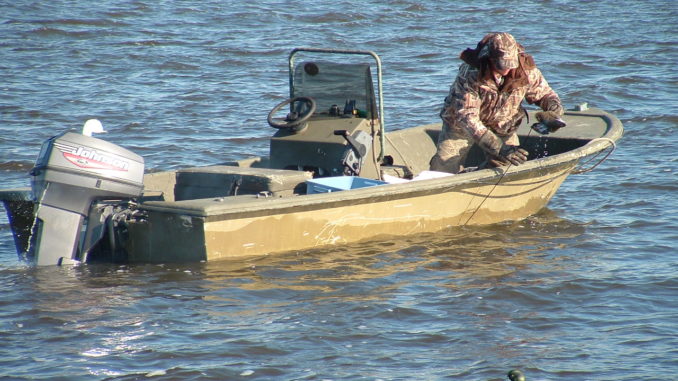
The N.C. Wildlife Resources Commission has scheduled a series of nine public meetings statewide to discuss the upcoming waterfowl hunting seasons. The agency will take into account comments from these meetings when establishing the 2006-2007 waterfowl season regulations at its Aug. 30 meeting.
Three meetings will be held each day at the following locations:
• Tuesday, Aug. 15 — Manteo, N.C. Aquarium at Roanoke Island; Albemarle, Stanly County Courthouse; and Clyde, Haywood Community College, Room 318.
• Wednesday, Aug. 16 — New Bern, Craven County Courthouse; Graham, Alamance County Courthouse; and Morganton, Burke County Courthouse.
• Thursday, Aug. 17 — Louisburg, Franklin County Courthouse; Elizabethtown, Bladen County Courthouse; and Yadkinville, Yadkin County Courthouse.
All meetings begin at 7 p.m.
This year’s federal frameworks for waterfowl in the Atlantic Flyway differ slightly from last year. This year one canvasback per day may be allowed for the entire 60-day season. In addition, two hooded mergansers per day also may be allowed. The hooded merganser bag limit had previously been one per day. Although breeding population estimates for scaup continue to decline, the two-scaup-per-day bag limit may continue for the 2006-2007 season.
Last season marked the first year since 1991 that regular season Canada goose hunting was allowed in the Northeast Hunt Zone, which comprises all or parts of 11 northeastern counties. This experimental season is restricted in that a special permit is needed to harvest one goose per season in this area.
For the upcoming season, the WRC may issue 1,000 permits, an increase of 500 permits from last year. In addition, the season length may be expanded from 15 to 30 days and will run from late December to late January.
Regular season frameworks for waterfowl, as proposed by the U.S. Fish and Wildlife Service, include:
• Ducks, coots and mergansers: 60 days with no more than three splits between Sept. 23 and Jan. 28. (black and mottled duck season closed until Dec. 1; no season for harlequin ducks.)
• Special sea ducks: in special sea duck area only, Sept. 23-Jan. 31.
• Brant: 30 days with no more than two splits between Sept. 23 and Jan. 31.
• Light geese (snow, blue and Ross’ geese): 107 days, three splits between Oct. 1 and March 10.
• Tundra swans: 90 days, no splits between Oct. 1 and Jan. 31, permit only.
• Dark geese (Canada and white-fronted geese): Resident Population Zone, 70 days between Oct. 1 and Feb. 15, two splits; Southern James Bay Zone, 70 days between Oct. 1 and Dec. 31, two splits; and Northeast Hunt Zone, 30 days between Dec. 25 and Jan. 28, permit only.
Compensatory days are allowed for Sundays because of N.C.’s no-Sunday-hunting regulation.
Proposed daily bag limits under the federal frameworks include (possession limit would be twice the daily limit, unless otherwise noted):
• Ducks: six ducks with no more than one black duck or one mottled duck; four mallards with no more than two hen mallards; four scoters; two wood ducks; two redheads; two scaup; one canvasback; one pintail; and one fulvous tree duck.
• Snow geese: 15 with no possession limit.
• Brant: two.
• Coots: 15.
Proposed bag limits for Canada and white-fronted geese (in aggregate) will vary by time and zone and include:
• Statewide (except Dare County special zone): September, eight.
• Dare County special zone, September, two.
• Resident Zone, regular season after Sept. 30, five.
• Southern James Bay Zone, regular season after Sept. 30, two.
• Northeast Hunt Zone, one per season with permit.
To voice an opinion on how the WRC should set waterfowl regulations within these federal frameworks, attend one of the nine public information meetings, or submit written comments by Aug. 22 to the N.C. Wildlife Resources Commission, Division of Wildlife Management, 1724 Mail Service Center, Raleigh, NC 27699-1724, or call (919) 707-0050.



Be the first to comment